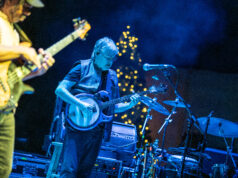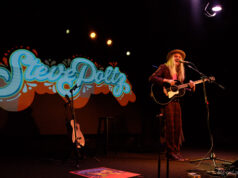
As much as any of her beloved songs, Lucinda Williams’s life is a great American story, from growing up as the child of a poet to becoming a rock ‘n roll survivor. For a couple of hours at the Lincoln Theatre, she recently shared songs, stories, and visuals — photos and videos — of her unique journey, as she brought her Don’t Tell Anybody The Secrets Tour to DC.
Williams and her crew also refer to these shows as the “book tour,” as it shares the name of the memoir she released to wide acclaim in 2023. (It’s gripping stuff; I read the entire book within 24 hours.) The phrase comes from a lyric in the song “Metal Firecracker” from her landmark album Car Wheels on a Gravel Road.
Before she had even spoken or sung a word on Nov. 19, Williams received a standing ovation. A few years ago, she had a stroke, affecting her mobility and ability to play the guitar. Fortunately, her mind is a sharp as it’s ever been, and her singing is as good as it’s been in a long time. Lucinda has always been appreciated by her dedicated fans, but these recent events have made us appreciate how lucky we are to still be able to enjoy this American treasure.
Williams’s father, Miller Williams, was a poet and academic whose career took him and his family all over the south (and even, during Lucinda’s teens, to Mexico City for a short time). Miller loved music, a passion he passed on to both Lucinda and her brother. When she was about six or seven years old, they were living in Macon, Georgia, where they discovered the street preacher and blues gospel singer who would lend his name to “Blind Pearly Brown.”
Miller passed down his love of Hank Williams in particular. He even met the man known as the “Hillbilly Shakespeare” once, and they went out drinking after a show. When she recorded her first album for Smithsonian Folkways, a collection of folk, blues, and country covers called Ramblin’ On My Mind, Lucinda included Hank’s “Jambalaya.”
As a writer himself, Miller often offered advice and criticism on Williams’s lyrics. When he heard her play “Car Wheels On A Gravel Road” at the Bluebird Cafe in Nashville, he realized (and told her) that the child depicted in the song was, in fact, Lucinda. “I realized I could save a lot on therapy by putting things into songs,” she said. After his passing, she paid tribute to his influence by turning some of his poems, like “Dust,” into songs she recorded. “I miss him so much,” she said.
Watch Lucinda Williams perform “Car Wheels on a Gravel Road” live from Austin, Texas, on YouTube:
Through her father, Williams came to know a young, brilliant poet, Frank Stanford. Everyone thought he was destined for big things, but he was fighting “demons,” a battle that he lost, committing suicide. These experiences largely inspired the album Sweet Old World, and his funeral, which she described as a “southern Gothic scene,” is chronicled in “Pineola.”
Like so many families, Williams’s is complicated. Her mother suffered profoundly from mental illness; after her death, Lucinda wrote “Heaven Blues” as an attempt to make her own “holy blues” song. Her younger brother has also had his struggles, which inspired “Little Angel, Little Brother.” Highly intelligent, charming, and attractive, he was also a “troublemaker,” a term that came up a few times during the evening. Unfortunately, they’re not in contact now, and she’s not even sure where he’s living. “If you see him,” she said, “tell him to get his ass home.”
Her grandparents, on her father’s side, were a large presence in her life. Her memories of them and their white house inspired her to write the lovely “Bus To Baton Rogue.”
Like many of the singer-songwriters of her generation, Lucinda was inspired by the folk revival of the ’60s. In her teens, she started taking guitar lessons, and the first song she learned to play was the country-blues standard “Freight Train,” by Elizabeth Cotten. As she noted, Cotten was a housekeeper for the Pete Seeger family.
When she was 12, Williams was introduced tot he artist who would become her biggest influence, Bob Dylan. One of her father’s students brought a copy of Highway 61 Revisited. Though “I didn’t understand all the words,” Lucinda fell in love with his music, and with the man himself. “I wanted to be with Bob Dylan and look like Joan Baez.” The set included a cover of one of the songs from that album, “It Takes a Lot To Laugh, It Takes a Train To Cry.”
Her own songwriting really picked up after she moved to Austin in 1974, when the city was full of young hungry songwriters like Butch Hancock, Jimmie Dale Gilmore, and Nanci Griffith. In 1980, she recorded her first album of original songs, Happy Woman Blues, of which she played the title cut.
After her time in Texas, Williams moved onto Los Angeles, despite the misgivings of her friends in the Lone Star State. Living in an apartment in the Silver Lake neighborhood, she played everywhere she could and started to develop some buzz around her name. A demo tape for a major label didn’t lead to a recording contract, but the tape made its way to the European punk label Rough Trade. They were looking to expand their roster and signed her to make her self-titled album, which includes many of her most covered songs, like “Crescent City,” a paean to New Orleans.
Stream “Crescent City” by Lucinda Williams on YouTube:
The term “troublemaker” came up again when Williams talked about the man who would inspire “Lake Charles,” Clyde. Like her brother, he was charming and intelligent, very funny, the life of the party, but the partying life eventually caught up with him. Another “colorful” character she encountered during her travels was the late singer Blaze Foley, whose life and tragic, senseless death inspired “Drunken Angel.”
Both of these songs appeared on Car Wheels. Williams addressed the drama that surrounded that album, which came out six years after her previous record, Sweet Old World. The press had a field day, labeling her “difficult to work with” and “a perfectionist.” (There are absolutely issues of gender-specific criticism that are tied up in this.) She said she was having trouble getting some of the songs to work when Steve Earle asked her to duet with him on “You’re Still Standing There.” Lucinda heard the rough mixes of the album I Feel Alright and decided she wanted Car Wheels to sound like that. She headed back into the studio with Steve and engineer Ray Kennedy intending to just re-cut a few songs, and they ended up re-recording the same album.
As Williams noted, for all the criticism that surrounded her process, you can’t argue with the results. Car Wheels won a Grammy for Best Folk Album, although it was perhaps her least folk-oriented album to that point — the album is more heartland rock than folk. It’s something of a fool’s game to argue about what genre her music is, because, in the way of many Americana artists, she draws on a variety of musical traditions, including folk, blues, country and rock.
In the same way that artists often draw from across genres, the similarities between artists often transcend them. While there are certainly differences in their sound, the closest comparison case to Williams is probably Chrissie Hynde of the Pretenders. Both are tough, no-bullshit female songwriters from the heartland who are spiritual offspring of Bob Dylan. Each has a spare but elegant writing style, and neither tows the line as far as the traditional roles and stereotypes of women in music. I wasn’t surprised to learn they are good friends.
Bringing things full circle, Lucinda and her band played “Ghosts of Highway 20.” She describes it a sort of latter-day companion piece to “Car Wheels,” a tale of the road that connects many of the places she lived during her childhood. She finished the main set, appropriately enough with “Where The Song Will Take Me,” which appears on her most recent album of original material, last year’s Stories From a Rock & Roll Heart. It’s about the joy and solace she finds in writing songs.
We were lucky to get an encore, as Lucinda and her band came back out and did George Harrison’s “While My Guitar Gently Weeps.” It appears on the album of Beatles covers, recorded at Abbey Road Studios, that will be out next month. Then she sent the audience home with the anthemic “Joy.”
This was a magical evening, filled with incredible songs, stories, and images. Lucinda has a great band, but the real star as always with her is the songs themselves: She’s simply one of the finest songwriters in the world.
Here are some photos of Lucinda Williams performing at the Lincoln Theatre on Nov. 19, 2024. All pictures copyright and courtesy of James Todd Miller.

























